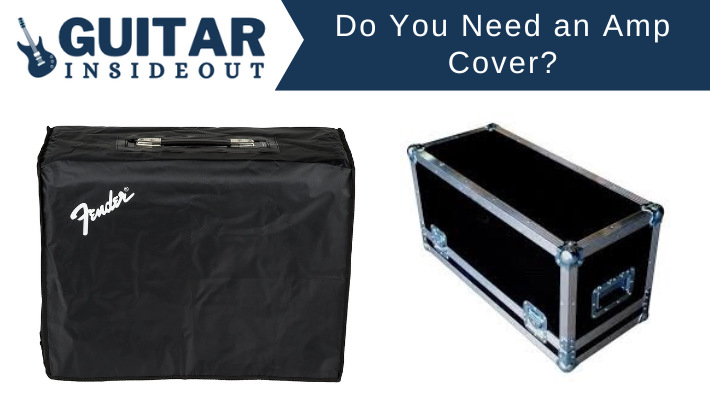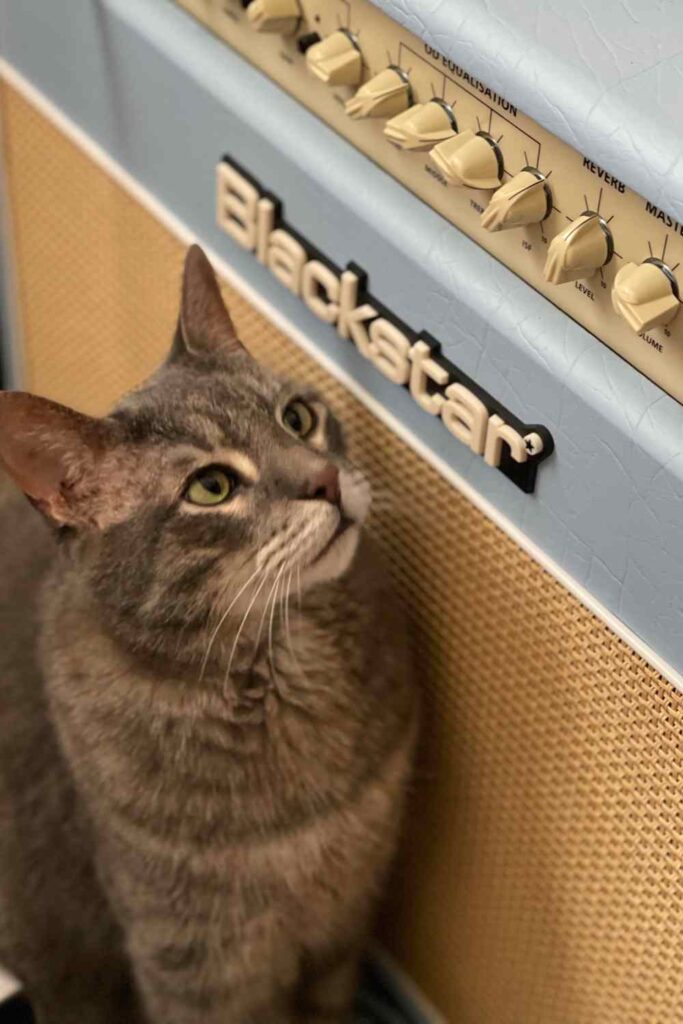For a very long time I wondered whether I needed an amp cover. Living in a fairly dusty house I was worried my amps were destined to be ruined by it and one day wouldn’t turn on. That’s without the fear of scratching, staining or spilling something on them.
Even though months went by and my amps didn’t seem to be affected by the dust I couldn’t shake the feeling I was doing the wrong thing. It only made sense – the dust would get into the electronics and cause problems. So I bought covers for them.

But did I need to? Did I need an amp cover? Or was I worrying over nothing and tricked by good marketing copywriting?
Let’s take a look at whether you
Do you Need an Amp Cover?
The simple answer is – it depends. If you only play at home and are careful then an amp cover isn’t going to make much difference. If you’re moving your amp regularly for gigs or it’s in storage then a case or cover is probably a good idea.
The real area where it will make difference is aesthetically. An amp cover will keep it looking good.
A decent cover will protect your amp if you bang into or hit it with something. If you’re looking to avoid scratches or dings then keeping a cover on it when it’s not being used will reduce the risk of them significantly.
An amp cover will also guard your amp from things like water damage or other spillages.
But I went years before getting any covers and during that time I never wrecked or broke my amps through spilling something on them. Even the marks that they picked up were very minimal.
And the dust was never an issue. I just got it into my head that my amps were heading towards an early grave. But I don’t worry about any other electronic items and feel the need to cover them. My toaster or washing machine haven’t got covers.
So dust isn’t really a problem and if you’re careful around your amp then a cover really isn’t necessary if you’re only playing at home.
READ MORE: How Long do Guitar Amp Tubes Last?
Reasons You Might Need an Amp Cover
There are certain times where a cover is required though.
Pets
Pets, especially cats, can be a nightmare when it comes to amplifiers. Fur gets everywhere and can be a bigger problem than dust when it gets into the workings of an amp.
Cats also love to scratch things. Even more so anything that’s new or different. It’s like a tractor-beam draws them to something they haven’t seen before, and they can’t help but sit on or test out what it is with their very sharp claws.
Thankfully my cats never decided any of my amps would make a good scratching post but there’s countless stories of tolex and grilles getting ripped by cats claws.
All pets can be clumsy too. Dogs and cats can easily crash into an amp or knock a guitar over.
And I haven’t even mentioned them peeing or marking their territory…
So if you’ve got pets (mostly cats!) then a cover is almost certainly going to be needed.

Kids
Much like pets, having kids can be bad news for your beloved amp or amps. Toddlers and young children are very good at wrecking your most treasured things.
Leave a young child alone with something you love for a few minutes and there’s a good chance they’ll do something to it. Climb on it, tip it over, draw on it with magic marker, spill juice on it – this list is endless.
And for a child a big, shiny amplifier is going to be super fun to climb or draw on. Or push things into the many holes and sockets it has.
So if you’ve just had a baby or have young children it might be in your best interest to get a cover of some sort. Just for peace of mind.
READ MORE: Guitar Amplifier Buying Guide: What to Consider
Transport
If you need to move your amp – either transporting it to somewhere else or when playing gigs – a cover or case is important. Moving a valuable amplifier makes it vulnerable to getting damaged.
It could get dropped, slide around in the car or van it’s being transported in or another bit of gear smash into it. A good case though will guard it from virtually everything.
The case not only protects the amp but it protects your car or van when transporting it. Amps can dish out some damage themselves. They’re big, heavy and can have sharp edges – perfect for scratching car interiors or breaking things off.
There’s also weather to consider. If you try moving your amp around without a cover and it starts raining you’re going to have problems. Water and electronics are not a good mix.
So when transporting your amps anywhere you should put them in a case/cover.

Gigs
Similar to transporting but if you’re playing live it’s useful to have your amps covered or in a case. Obviously whilst your actually playing that’s not possible but up until that point it’s best to keep them as well protected as you can.
Live venues are busy and full of people who don’t understand or care about your amps and their well-being. They’re likely to spill beer on them, knock them over, scratch or mark them.
So an amp case for when you’re gigging is definitely a good idea.
Storage
If you’re putting an amp away in storage for a while with no intention of using it then covering it is probably a good idea. It’s when you don’t use gear for a long period of time that it’s more likely to develop problems.

OCD
I’m being slightly tongue-in-cheek but some people are determined to keep their gear in perfect condition. If the thought of a scratch or mark on your amp terrifies you or smudges and fingerprints from people touching them drives you nuts then a cover is going to put your mind at ease.
Can You Make Your Own Cover?
I’ve seen quite a few guitarists who have improvised and used whatever they’ve got lying around the house as a cover. Towels thrown over the controls, old bits of clothing cut up, a duvet chucked on top of amps etc.
Anything that can stop the amp from getting marked or keep the dust off is doing the same job as a bought cover. In fact it’s probably a better idea – why spend money on something when you can improvise just as well for free.
Basically if it works for you then go for it!
Conclusion
So, do you need an amp cover? Well if you’re just playing at home then no. You can toss a towel or something over your amp if you’re really worried about scratches or pets/kids but generally speaking they’re not needed.
If you’re gigging and moving your amp regularly though then you will want to invest in a cover or flight case. Damage from transpiring it in a vehicle, the threat of rain or snow and general bumps are all likely. So getting a case will protect your amp and keep it working for years to come.